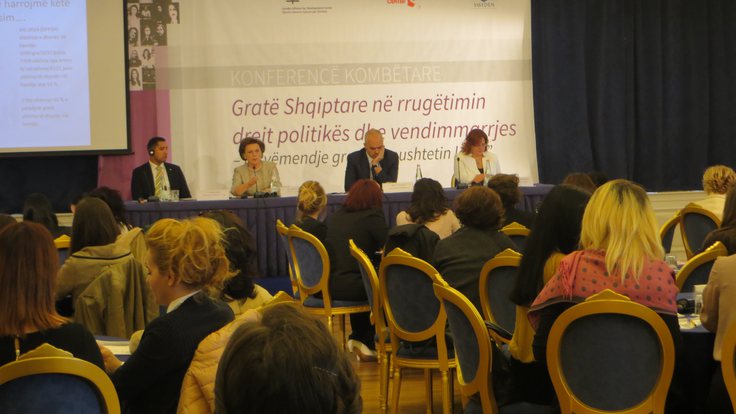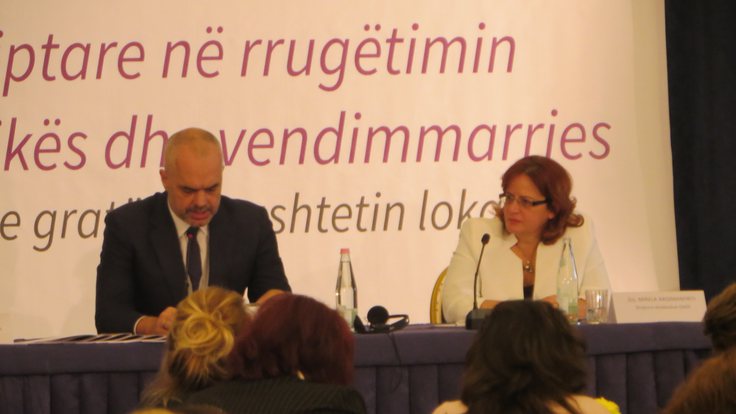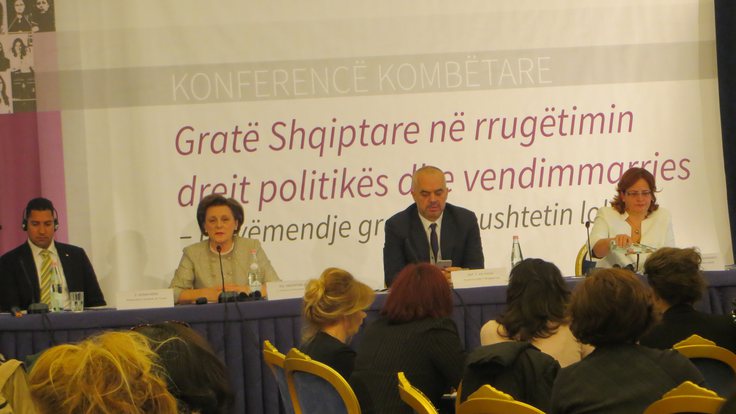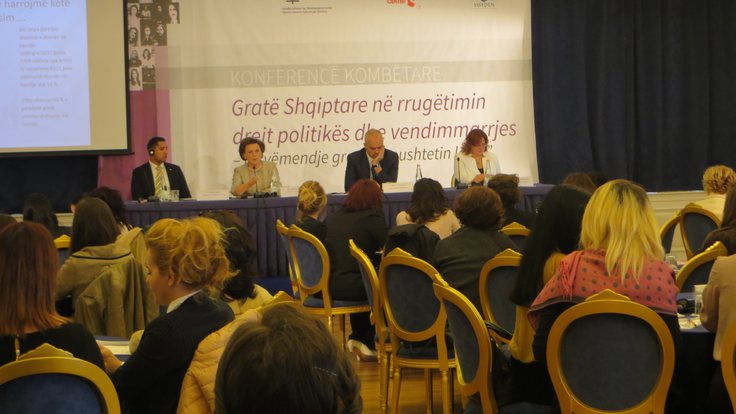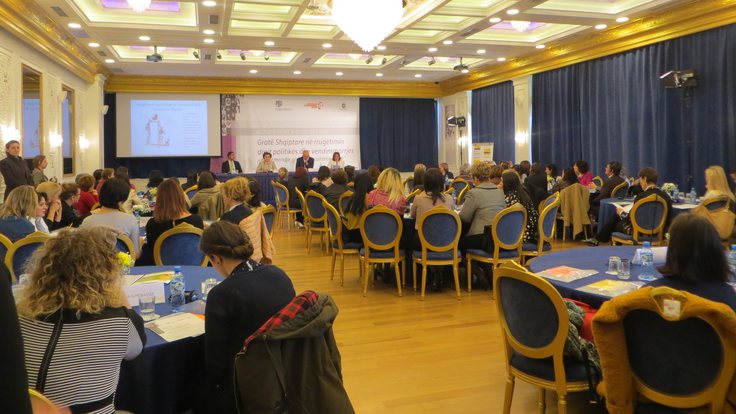Projekte
Women’s in Politics and Decision Making
Donor: Olof Palme International Centre
Project duration: January 1, 2015 - December 31, 2015
Preparation of gender analysis and gender action plans in 9 municipalities run by women as mayors; develop feasible Gender Action Plans (GAPs) for the 9 municipalities; cost and validate the GAPs with the city council members; train the municipality officials to implement the personalized GAPs. In addition a research study, and a high level conference with politicians and decision making representatives to present the findings and opened the debate on higher women representation in politics and decision making.
The activities organized in the frameowrk of the project:
Activity 1: In the kickoff event of February 10, 2015 participated representatives of different local institutions, women member of the parliament, donors and colleges from civil society organizations. The event was opened by Ms. Mirela Arqimandriti, executive director of Gender Alliance for Development Centre. She introduced the overall project objectives and project implementation phases. This project will be implemented in 20 municipalities in Albania and will include about 100 women and girls from these municipalities. The project will be implemented in several stages, including the period before, during and after the election about local elections 21 June 2015. Also, she expressed her personal full commitment but also GADC total engagement in boosting women participation in decision making. She stated that our main aim is increasing the number of women mayors and women member of city councils after June 2015 Local Elections. It will be difficult, but at least we have started the war and we are going to undertake concrete actions in order to achieve this aim all together. During the activity was introduced the online platform “www.AjoGaron.com”, as an
interesting community tool to propose women as potential candidates but also as an opportunity to promote all the women candidates profiles. The platform was launched in 8 March 2015 and was managed during the whole period by Gender Alliance for Development staff. On the other hand, guest speakers of the event, Ms. Eglantina Gjermeni, Minister for Urban Development; Ms. Majlinda Bregu; Ms. Mesila Doda and Ms. Albana Vokshi and Ms. Keti Bazhdari shared their personal experiences and all the struggles they have faced since they started being part of politics. Minister Gjermeni told that the number of women in municipal councils will be 50 % and government has the commitment to make it happen.
Activity 2: The site www.ajogaron.com is dedicated only for women in politics and decision-making. This site will promote initially the women member of the Albanian Parliament and women ministers in Government, starting from January 2015. This portal will continue on presenting the women candidates for mayors in the local elections of June 2015, and later with the promotion of elected mayors. This portal will continuously promote women who represent us in decision making in every election. This new portal is the pinnacle of the ongoing work of the GADC, started in early 1994, to increase the representation of women in decision-making and politics in Albania. In this site, which is in the process of updating and uploading other documents, the reader will find speeches, declarations, slogans and part of works of women in politics and decision making, in protection of the rights of other women, which hopes to have the right representation in the highest levels of decision making in Albania. The website www.ajogaron.com, gives everyone the opportunity to support and to promote women in power. The section "Get Involved" invites you to propose a woman for the upcoming local elections to run the mayor office or for the member of the city council.
Activity 3: 20 focus groups with 609 women participation have been organized during February, March and April in 20 different municipalities. The focus groups have been conducted by women expert’s head of NGOs in local level or official working in the municipality level. The focus groups have been organized around an agenda with the following main objectives: i) presentation of the organization, project and the rationale about the positive effect of more women in decision making; ii) discussing through questions about how is the focus groups representative perception about the level of women representation in their municipality; iii) ways toward increasing women’s participation and representation in decision making level.
Activity 4: The meetings with the mayors were all successful in determining the basis for the collaboration during the data collection for the writing of the baseline report and the Gender Action Plan. After receiving feedback from the municipalities, the GADC team started its tour of meetings with the mayors with Mrs. Miranda Rira, Mayor of the Municipality of Prrenjas. After the presentation of the project to her and her staff, she kindly appointed a person of contact from the municipality to arrange the communication between them and us during the time of the project. The same thing was done with the other municipalities (Patos, Roskovec, Ura Vajgurore, Gjirokastra, Libohova, Saranda, Gramsh and Shkodra). We didn’t meet with any problems regarding communication and information sharing with the mayors and their staff. They all were eager to contribute and help in writing the baselines and giving their suggestions for the action plans.
Activity 5: The workshops served in securing contacts with local officials and data needed for the writing of the reports and the community’s needs assessment. Following the chosen methodology, the GADC team conducted workshops and focus groups in all the chosen municipalities. The first ones were in Patos and Roskovec, given their short distance from each-other. During the first workshops were identified the main problematics, which as were realize later, were similar from one municipality to another. In each workshop, the GADC experts acted as facilitators and collected information and data according to the indicators and also the participants’ opinions and suggestions about action plans. The participants were specialists (men and women) of the indicators’ fields (economy, social services, etc) who worked in the administrative institutions and could give the data needed for the baseline reports, but also people from civil society and the community. The list of indicators was given to them beforehand by the person of contact in the municipality, in order for them to have more time for collecting data and give their opinion on the matters. (For the list, please see the documents attached). In each workshop the GADC experts introduced themselves, the organization and the purpose of the workshop. Then they explained how the activity would go on and what was expected from the focus-group. To facilitate the discussion and the collection of data, the experts divided the participants into 4 (four) smaller groups for each field of indicators; economy, domestic violence, social services and women’s participation in decision-making processes (locally). These groups wrote the data and their opinions in charts, exchanged their charts with the other groups so that everybody may write and in the end discussed the results altogether. This was done in almost all the workshops with the exception of Ura Vajgurore, Gjirokastra and Libohova where there was a free discussion between the participants (facilitated by the experts). Everyone in the focus-groups managed to express their opinion and the discussion was very interesting because all the members came from different backgrounds and had different professions which ranged from employees of the local administration and municipality, to teachers and police officers.
Activity 6: National Conference “Albanian Women Walking Path, toward politic and decision making- Special focus to women in power in local government” was held on 7 December 2015, Hotel Tirana International, Classic Hall.
In this activity participated more than 153 people. The conference was attended by the Prime Minister Mr. Edi Rama, Mr. Johan Ndisi, charge d'affaires of the Swedish Government in Albania, Valentina Leskaj, Deputy Speaker of Parliament, MPs, ministers, women mayors, donors, representatives of national and international NGO-s, women members or parliament, women members of municipalities and city councils, partners, local coordinators, members of civil society, media representatives. The activity was opened by Mrs. Mirela Arqimandriti, the executive director of Gender Alliance for Development Center, who stated that “The issue of equal representation of men and women in policy and decision making is a matter which must advance rapidly. According to Mr. Rama, gender equality has a direct impact on social and economic development. “The level of civilization, economic and social development is directly linked to gender equality, when we talk about democratic countries and institutions emanating from the elections," said Rama.
Further on in his speech, he said that the government opened a new chapter in the process, after bringing down several resisting walls for a relatively long period. “In principle, we had all agreed that there should be more room for women in political life but, when it came to the election time, the wall was very stubborn”, said Rama, as he recalled the efforts the current level of representation in City Councils failed for many years. The charge d'Affaires of the Swedish Government in Albania, Johan Ndisi considered as an important issue women's role in society, even at a personal level. “I am proud that I can describe myself as a feminist. A feminist is someone who recognizes the equality of rights between men and women, one who considers this issue as a very important one”. During the second panel moderated by Mrs. Plejada Gugashi, Mrs. Mirela Arqimandriti and Ms. Megi Llubani introduced to participants a 6 step model of promoting and empowering women in politics and decision making, with a special focus on the role of political parties. The panel was then followed by a Q&A session where several participants focused on evaluating the six step model. One such example was the remarks made by Ms. Mirela Bogdani, member of the Municipal Council of Tirana, who focused on conditions that need to be met to promote women in politics and decision-making. The six steps model studied and presented by the panelists was originally designed by Mona Krook and Pippa Norris and endorsed by OSCE/ODIHR as a tool to increase the participation of women through quantitative and qualitative measures. The first important step is ensuring constitutional and legal rights of women to elect and be elected free of discrimination. The second step involves the electoral system and how it impacts gender equality in public office and elections. The third step revolves around gender quotas in candidate lists as well as within political party structures. The fourth step deals with internal recruitment procedures of political parties and what can political parties specifically do to empower more women in the political arena. The fifth step is very important as it deals with capacity building, including developing skills that are essential for public office, networking opportunities and building experiences through different mechanisms. The last steps focuses on parliamentary rules for women MPs and representatives in the parliament, including working hours, maternity leave and other internal regulations that should be gender sensitive. The panel concluded with a few remarks by the moderator, who focused on the quality versus quantity of women representation in the political life of the country and what can be done to improve the level of their participation and decision making powers. The closing conference was successful in presenting all the parties concerned with the current situation of the women’s participation in decision-making and society as a whole. The mayors of the 9 (nine) chosen municipalities also presented their action plans for the next 4 years.
GADC
Research and Papers






